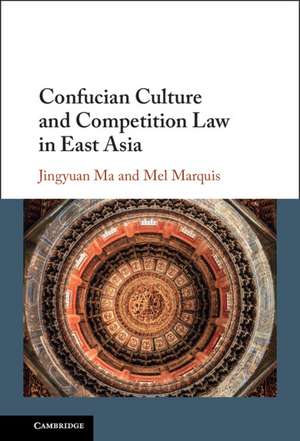Confucian Culture and Competition Law in East Asia
Autor Jingyuan Ma, Mel Marquisen Limba Engleză Hardback – 7 sep 2022
Preț: 705.89 lei
Preț vechi: 820.81 lei
-14% Nou
Puncte Express: 1059
Preț estimativ în valută:
135.07€ • 141.53$ • 111.66£
135.07€ • 141.53$ • 111.66£
Carte tipărită la comandă
Livrare economică 11-25 aprilie
Preluare comenzi: 021 569.72.76
Specificații
ISBN-13: 9781108488235
ISBN-10: 1108488234
Pagini: 400
Dimensiuni: 159 x 235 x 28 mm
Greutate: 0.74 kg
Ediția:Nouă
Editura: Cambridge University Press
Colecția Cambridge University Press
Locul publicării:Cambridge, United Kingdom
ISBN-10: 1108488234
Pagini: 400
Dimensiuni: 159 x 235 x 28 mm
Greutate: 0.74 kg
Ediția:Nouă
Editura: Cambridge University Press
Colecția Cambridge University Press
Locul publicării:Cambridge, United Kingdom
Cuprins
1. Introduction; 2. Confucian Culture and Its Influence in East Asia; 3. Confucian Business Culture and Its Implications for Competition Law; 4. Confucian Corporate Culture and Competition Compliance; 5. Confucian Political-Bureaucratic Culture and Its Links with the Administrative Enforcement of Competition Law; 6. Confucian 'Litigation Culture' and the Under-development of Private Antitrust Enforcement; 7. East Asian Legal Culture and the Regional Response to the Criminalization of Cartel Conduct; 8. Conclusion.
Recenzii
'This is an exemplary piece of social research that illuminates an important feature of international competition law and business arbitration. As well, it stands a model for all those who want to undertake comparative research on law and legal culture. It should have a wide readership far beyond those interested in Asian-pacific business law and practices.' Malcolm M. Feeley, Claire Sanders Clements Dean's Professor of Law, Emeritus; Jurisprudence and Social Policy Program, School of Law, UC Berkeley
'This book deeply describes the influence of Confucian culture on competition law in East Asia. Confucianism certainly influences politics, economy, society and law in China, for example, competition was deemed as a dreadful monster of capitalism in China even in the 1980s. However, even China's competition law will be imprinted with traditional culture inevitably, but its development depends almost solely on the breadth and depth of China's economic system reform.' Xiaoye Wang, Distinguished Professor, Shenzhen University; Professor of Law, Chinese Academy of Social Sciences
'This book is an outstanding work and a tour de force for everyone interested in competition policy and in business law and culture as well. When, in the wake of globalisation and of worldwide spill over of competition policy spurred by the International Competition Network, competition rules have expanded its role in East Asia, especially in China. It is fundamental to understand, as the authors rightly argue, that culture contributes to the shaping of its institutions. Reading this book is a major first step for understanding that reality and its far-reaching consequences.' Luís Silva Morais, Jean Monnet Professor of Law, University of Lisbon
'This book deeply describes the influence of Confucian culture on competition law in East Asia. Confucianism certainly influences politics, economy, society and law in China, for example, competition was deemed as a dreadful monster of capitalism in China even in the 1980s. However, even China's competition law will be imprinted with traditional culture inevitably, but its development depends almost solely on the breadth and depth of China's economic system reform.' Xiaoye Wang, Distinguished Professor, Shenzhen University; Professor of Law, Chinese Academy of Social Sciences
'This book is an outstanding work and a tour de force for everyone interested in competition policy and in business law and culture as well. When, in the wake of globalisation and of worldwide spill over of competition policy spurred by the International Competition Network, competition rules have expanded its role in East Asia, especially in China. It is fundamental to understand, as the authors rightly argue, that culture contributes to the shaping of its institutions. Reading this book is a major first step for understanding that reality and its far-reaching consequences.' Luís Silva Morais, Jean Monnet Professor of Law, University of Lisbon
Notă biografică
Descriere
Shows how cultural factors have influenced the development of competition law in China, Japan and Korea.
